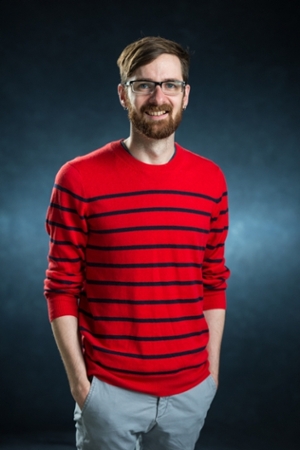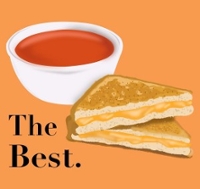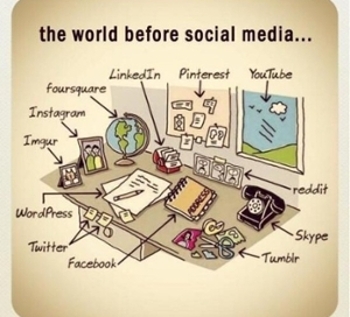Grilled Cheese Iron Maiden and Showing Up - Memories of First Year Part 1
Author: Fredericton Arts
Posted on Aug 6, 2015
Category: Faculty , Spotlight , Student , Opinion , Arts
The countdown is on!
In one month we will be welcoming hundreds of new students to campus for Orientation Week. The first year of university is an exciting and emotional time. It isn’t only about learning how to study well (though that is a big part!) – it is a host of new experiences that will stay with you for years to come. What do you think will stand out this year and stick with you years later? I decided to ask a few local Arts alumni to take a trip down memory lane to see what has stayed with them. We talked about food, smells, music, people, obstacles, and what is different now compared to their time at university. Check out what they had to say, laugh at the things that have changed since they were in first year, and learn a bit about what you might expect this fall.
First up!
Neil Cole, Academic Advising Support Coordinator and Arts 1000 Instructor
Master of Arts in Political Science
First Year: 2002, UNB Fredericton

What song sends you back to your first experiences at university?
Neil: “Well I used to listen to a lot of classic rock in high school so I didn’t really listen to a lot of the same music that my peers did. But fortunately at the time there were a lot of different classic rock songs being remixed like Steppenwolf and some other things. I’m trying to think… I lived in temporary residence for the first term of my year…they had so many students applying that they couldn’t stick us all in residence rooms so I lived in the Forestry building up the hill [Maritime College of Forest Technology at the top of Regent Street] with like 17 other students for the first term of my first year and a whole bunch of us all listened to classic rock so there was a lot of Led Zeppelin, Black Sabbath, and Iron Maiden. So we listened to a lot of older music but oddly enough a lot of us connected around that, those songs. We brought our records with us from home…
[On Dealing with Stress:] Humour was important and music, put some Iron Maiden on, like “Run to the Hills”… It helps elevate you above whatever is bothering you… that’s stoicism.”
What smell brings you back to your first week at university?
Neil: “French fries, deep fried food in meal hall. When you walk in you know the smell of deep fried food, that hot oil. That’s one of the first things that came to mind – fried food. And the second one that came to mind, because we lived in temporary residence, they gave us the first floor of that residence, and so the second and third floors were the forestry students. They had a smoking lounge a floor above our lounge so when we would come in we could smell their cigarette smoke. That was before smoking was banned indoors..."
What was your favourite food during that your first year?
Neil: “Grilled cheese and tomato soup: it was a staple in high school because it was quick and easy because I was "a walker". We almost always would eat lunch at home so grilled cheese and tomato soup was so easy to make when you have an hour to walk home, make lunch, and walk back to school. It was a perfect transitional meal – the comfort food…"

Are there any particularly significant people who stick out from that time? And what makes them memorable?
Neil: “There were two. One, she sticks out during the on-campus orientation and it was Kate Hayward (who ended up being my boss many years later) because we came to campus for the SOAR event. It was the July one I came to. I don’t remember a single thing they said. What I do remember is that when they started breaking us off into tutorials, they literally counted us off by number, you guys all go with her, go with him, etc. So it was a group of us and we all ended up moving off together and Kate was also the person who advised us and [explained] what sociology is, what Arts 1000 is going to be about… And the other person is my tutorial leader, Peter Kent, who used to be Dean. He was my tutorial leader. He was phenomenal…he knew that we would have to interact with each other to get what we needed out of Arts 1000 so he made us do a lot of ice breakers so we really knew each other before classes started. And at the end of the year he told me that I should be a peer mentor and it’s that piece of advice, that one piece of advice, that through all the other stuff that I’ve done, it put me where I am right now [in his current career]. It was him saying ‘You should be a peer mentor’ which turned into teaching Arts 1000 which turned into advising, which turned into doing advising in the summer, which turned into the job I have now. It was one thing he thought I should do -which is help other students- which has really cemented my career. And Kate was the other person who facilitated that to happen by hiring me and being very encouraging...”
How did you overcome obstacles or negative experiences?
Neil: “Temporary residence. It was away from the rest of the university. We had to be cabbed back and forth every day for all of our meals, to get to classes and whatnot and so there were cabs we would go get at McConnell Hall... It sucked. I really didn’t get along that much with the other guys [in temporary residence]. They were the kinds of guys that would say “Oh that’s gay.” I just couldn’t stand it and I would speak out when they would say it; I'd be like “Don’t you mean that’s stupid, it’s bad, I don’t like that...I would take that frustration and turn it into humour…You can’t change their behavior unless they want to change it so you kind of have to just let it go… It’s one of the things I talk about with advisors. Humour is integral to the work we do. Good lecturers use humour… Everyone relates to humour in some way… it’s a release. It shows everyone that you’re human and it really alleviates stress.”
Did you have a favourite and/or least favourite subject?
Neil: “Obviously Poli Sci [Political Science]! I took Pivotal Political Events with Thom Workman who ended up being my Masters’ thesis supervisor and one of my favourite profs. Great professor… Definitely poli sci. If you’re interested in sociology, history, economics, and maybe even psychology, if you are interested in the rest of the Faculty of Arts – take Poli Sci… My least favourite course was Macro-Economics which was also my worst grade…. I just didn’t find the material engaging, at least at the time for what I was interested in. I would probably feel differently about it now but in that moment, I didn’t care about it, and it reflected in my grade. It was probably one of the only courses where I felt like I just gotta get through this.”
What has changed since then? Or stayed the same?
Neil: “Temporary Residence again, it doesn’t happen anymore. Occasionally you might have a few students but not like 80 students at the Wandalyn [now the Howard Johnson on Prospect Street]. [That experience] can be a little bit alienating but fortunately that doesn’t really happen that much anymore.
There was no buzzfeed, no facebook…

Neil: “Yeah, that’s something that I sometimes forget because Facebook was only really starting to become a thing in my undergrad, I think I was in 4th year at the time. The invitations to get facebook! It was annoying!...Eventually it was like sitting in the meal hall or in the SUB and having all the people you’re sitting with saying like “Dude! Dude! You gotta get facebook, it’s amazing!” And then finally I got on it and your world changes! It was really different, it wasn’t an impediment to education, it wasn’t a tool for education, it was really different introducing social media into education. It really changed things. Not a single prof I had ever had a facebook account or used it as a pedagogical technique. No one ever used it as a group [like as a student group], even as a grad student and teaching I wasn’t using it. There was a still a debate “can we use Facebook, is it even safe to use for pedagogical purposes?...Youtube as well. I’ve used youtube to get little clips like Plato’s Cave, the Allegory of the Cave, there’s a little Claymation video, about 3 mins, that explains to them what the cave is. It takes like two mins for me to search it and then boom I have it. We never had profs do something like that because those things didn’t exist. It really helps with supplemental education, in a way…”
Anything else you would like to include about first year experience?
Neil: “Absolutely. Being engaged, being involved…Students who do not participate perform at a lower rate… we know it from [research] at other universities…The students who don’t show up compared to the students who do, do far worse, in a variety of ways. It’s not only academic because if they are not going to the social events with their fellow first year students they’re not getting to meet them… they’re not exposing themselves to different new things. All sorts of things that we want students to be doing is facilitated by the pure and simple act of showing up! Show up! You don’t need to be a leader, you just need to be there participating in your own education.”
-Interview by Tabatha Armstrong
